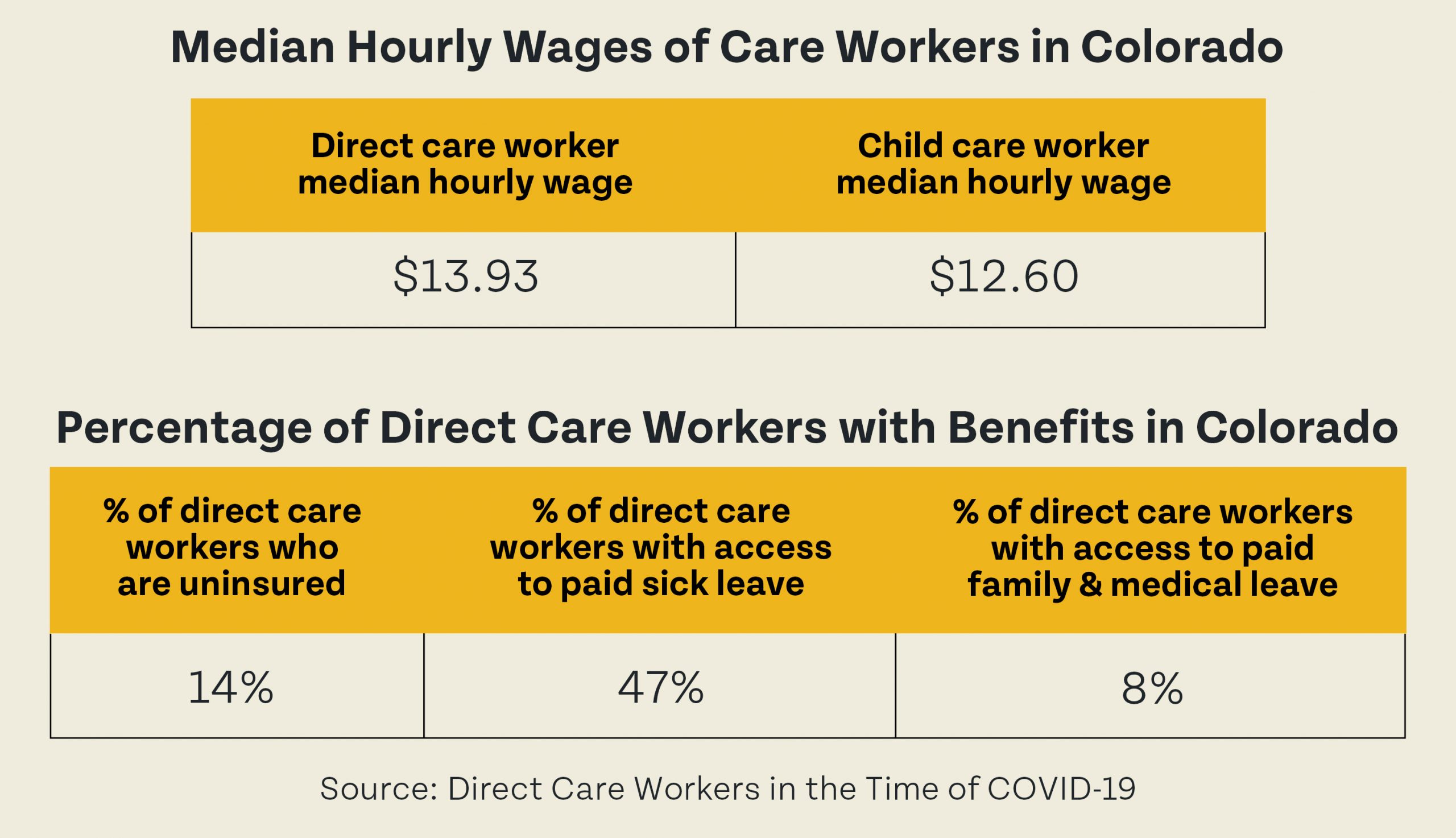A Year of COVID: Undocumented Workers in Colorado’s Caring Workforce
Undocumented immigrant workers play a critical role in contributing to industries essential to Colorado’s infrastructure, including the direct care and child care workforces. These jobs have also been deemed essential during the COVID-19 pandemic. The Bell recently explored the tax contributions of undocumented immigrants and their exclusion from many public benefits, and the same issue applies here: undocumented workers have been contributing to Colorado’s caring workforce in tremendous ways during the pandemic, despite having limited access to benefits such as paid family, medical, and sick leave and health insurance. Compounded with low wages, these workers and their families have been put in an increasingly precarious economic position during this year of the pandemic.
The invisible system of undocumented workers contributing to Colorado’s caring workforce without access to workplace benefits in return has always been inequitable, yet COVID-19 has exposed this system in a way that highlights how and why it’s not working. A year of this pandemic has shown it is critical we provide relief for our most hardworking and vulnerable community members, especially undocumented caring workers and their families.
Direct Care Workforce
Colorado’s direct care workforce, composed of home health aides, personal care aides, and certified nursing assistants, provides essential health services to older Coloradans in need of care. Older adults are especially vulnerable to severe illness from COVID-19; therefore, the roles of the direct care workforce have become even more critical to supporting older Coloradans during the pandemic. Direct care workers have put their own health at risk to provide important care for older adults and individuals with disabilities during COVID-19. Currently, noncitizens make up 6 percent of Colorado’s direct care workforce.
Child Care Workforce
Child care is critical for working families with children to enter or maintain in the labor force. Many undocumented immigrants provide unlicensed child care, and are critical to providing care as Colorado parents have both adapted to remote work and begun to return back to work in the pandemic. Women in the workforce were especially impacted by the pandemic due to having to stay home to provide care for their children. Therefore, the child care workforce plays a huge role in allowing women to re-enter the workforce during COVID-19.
COVID-19 Has Exposed & Exacerbated Caring Workforce Inequities
Despite undocumented workers being on the frontlines of the direct care and child care workforces during the pandemic, they more often lack access to essential workplace benefits to support them during these hard times. Wages for jobs in these industries also remain significantly low.

The impacts of the COVID-19 pandemic have both exposed and exacerbated workplace inequities in the caring workforce, especially for undocumented immigrants. Without access to paid family, medical, and sick leave, these workers are put in a difficult economic position if they or a family member gets sick with COVID-19 and need to take time off of work.
Undocumented immigrants are also not eligible to enroll in Medicaid, Medicare, the Children’s Health Insurance Program (CHIP), or the Affordable Care Act (ACA) marketplaces. Therefore, they often may be left without access to adequate health care if they get sick during the pandemic. Undocumented immigrants may have a higher risk of severe illness and death if they contract COVID-19 due to socioeconomic status and inadequate access to health care being linked to mortality and health.
Undocumented caring workers are exempt from many COVID-19 recovery benefits. Many file federal income taxes using Individual Taxpayer Identification Numbers (ITINs), yet them along with American citizens who filed jointly with someone using an ITIN were ineligible for relief provided in the CARES Act. They were also excluded from Pandemic Unemployment Assistance (PUA) under the CARES Act, which provides insurance-like benefits for workers ineligible for regular unemployment insurance. Therefore, if they did happen to lose their job during the pandemic they have no federal or state safety net.
“Back to Normal” Isn’t an Option, So Support for Undocumented Caring Workers Is a Must Going Forward
It’s critical undocumented immigrants in the caring workforce are included in future COVID-19 relief packages, as they play a crucial role in the nation’s recovery by providing some of the paid care people have been overburdened by during the pandemic. Biden’s recently passed American Rescue Plan will provide benefits such as stimulus checks and paid family, sick, and medical leave to mixed-status families, who are families with members who are both documented and undocumented. This will provide relief for some families of undocumented workers, yet families who are all undocumented are still excluded.
In 2020, Colorado passed Proposition 118, creating a state-facilitated paid family and medical leave program. It is important that Prop 118 is implemented equitably by allowing undocumented workers to qualify for benefits. A Left Behind Workers Fund has been established by Impact Charitable in Colorado to distribute cash grants to families not eligible for unemployment insurance and stimulus funds. Following this model of a community-based social insurance program may be something to consider even after the pandemic.
Wages need to be increased for jobs in the caring workforce so that these workers can achieve economic security. Raising the minimum wage to $15 per hour could make economic security more achievable. Also, in the 2021 Colorado legislative session, advocates are planning to introduce legislation to repeal HB06-1023 that would allow undocumented immigrants, including those in the caring workforce, to access government-sponsored health care benefits.
Direct care and child care workers provide invaluable care for Colorado’s older adults and children, and it is time that they are cared for in return.
